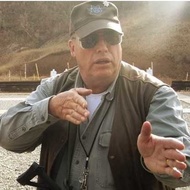5 Feb 15
“Delay in the use of force, and hesitation to accept responsibility for its employment when the situation clearly demands it, will always be interpreted as weakness. Such indecision will encourage further disorder, and will eventually necessitate measures more severe than those which would have sufficed in the first instance.”
United States Marine Corps Small Wars Manual, (1940)
From a good friend and Chief of Police of a medium-sized department:
“One of our officers, along with officers from a nearby department, plus two county deputies, responded recently to a desperate call from a frightened wife.
She indicated that her estranged husband was at home alone and had just shot all the family’s pets (dogs, cats, at least one horse). She said he had talked of suicide for some time. She had fled the house in a panic!
When officers converged on the rural location, they were greeted by a single male strutting about his front lawn, dressed in a T-shirt and jeans, and waving a Kalashnikov rifle in the air. The rifle had a thirty-round magazine, inserted. In his other hand the suspect was holding an large, autoloading pistol. A second pistol was clearly visible, stuffed into his waistband.
Upon seeing our police officers, the suspect shouted, repeatedly, that he was going to kill them all. His verbal threats continued for nearly five minutes! At one point, dash-cam video from a beat-car clearly showed the suspect within arm’s reach of at least one of our officers.
Our officers responded by (correctly) producing rifles and pistols, taking cover behind vehicles, and thus confronting the suspect at gunpoint. Yet, not one took further action, save endlessly commanding the suspect to drop his weapons. All such commands were contemptuously ignored.
Finally, one officer deployed his Taser. It took three ‘rides’ on the Taser before officers were able to get control of the suspect’s known weapons.
No shots fired. No one hurt. No headlines.
The suspect was eventually transported to a local hospital, but died (cause unknown) eleven hours later.
When I subsequently asked my officer why he didn’t shoot when threatened at close range by this heavily-armed suspect who clearly told our officer of his intent to murder him, my officer said:
‘I wasn’t sure he was an imminent threat.’
I then reminded him of his intense training with regard to action/reaction. He replied,
“Oh, I forgot about that…’
He then went on to say that he, and his colleagues, were all reluctant to shoot, because of all the negative publicity lately with regard to police use of deadly force.
I then nearly lost it, saying,
‘Son, that suspect may have been suicidal, but you were too- by choice! You were in the process of committing suicide by continually exposing yourself to an extreme, deadly threat while taking no action, save politely asking him to drop his gun(s)!’ When you’re unwilling to defend yourself with gunfire, when gunfire is clearly indicated, then you never should have been hired in the first place, and you need to get out of this business now!’
I continued,
‘You’re alive and unhurt this moment, through no fault of your own! You allowed that suspect to have complete control of a lethal situation for five long minutes. He could have casually murdered you any moment he wished, and you would have died in simultaneous amazement and denial. Then, imagine me having to tell all this to your widow and your parents!’
… and you thought being chief was an easy job!”
Comment: The foregoing represents a pernicious disease infecting all of the American law-enforcement community. The problem is not that we’re shooting too many people. The problem is that we’re not shooting nearly enough!
The result is dead cops. Cops who hesitated too long. Cops who gave the suspect too much of an edge. Cops who were hired, educated, trained, and equipped, all at great expense, but who never once “thought it through,” until it was too late!
Most of all, cops who are terrorized by the prospect of a shooting aftermath in which they will enjoy neither support nor backing from their department, nor from the community they serve, being “thrown to the wolves” by a cynical administration who knows they can “always hire more.”
“No amount nor type of training can substitute for personal experience, but training can provide a level of ability that will allow you to live through your first ‘experience.’
Yet, you must bring your own courage, determination, and audacity, which you either have or you don’t.”
Newman
/John


